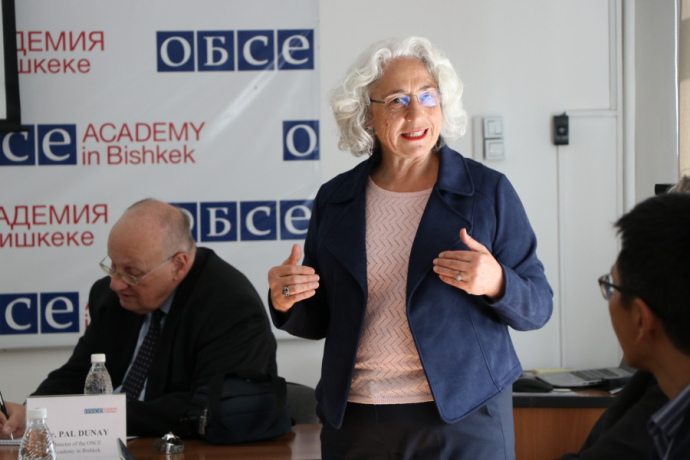News
OSCE Parliamentary Assembly Special Representative on Central Asia visits the OSCE Academy
On 26 April 2025, Ms. Farah Karimi, the Special Representative of the OSCE Parliamentary Assembly (PA) on Central Asia, Head of the Delegation of the Netherlands to the OSCE PA visited the OSCE Academy. She was accompanied by Ms. Ainur Argynbekova, Deputy Head of the Delegation of Kazakhstan to the OSCE PA, Ms. Femmy Bakker-De Jong, Secretary of the Delegation of the Netherlands, Ms Manuchekhr Salokhudinov, Senior Advisor, and Ms. Farimah Daftary, Senior Advisor. The guests were met by Dr. Pal Dunay, the Director of the Academy, Dr. Emil Dzhuraev, Senior Lecturer of its Politics and Security Programme, Dr. Sebastian Mayer, DAAD Associate Professor at the OSCE Academy, and Ms. Victoria Orazova, Head of the Academy’s International Department. Mr. Oybek Boborakhimov, Mr. Shamsurrahman Hamdard, Ms. Maral Jumadurdyyeva, Ms. Safina Saidibroimova, and Ms. Nurai Tynybekova, students of the OSCE Academy attended and actively contributed to the programme.
Ms. Karimi held a presentation on ”Civil Society’s Role in Safeguarding Human Rights: Navigating Geopolitical Crises and the Erosion of International Law.” Ms. Karimi started out from that international law is challenged as states either use it to their own advantage or when they notice they cannot they ignore and often violate it. The two ongoing big wars, between Russia and Ukraine and between Israel and Palestinians in the Gaza strip are eloquent demonstrations of this. Human rights are challenged globally. The general challenge to the respect for international law and the specifc one to human rights raises the question of how civil society can address the changing conditions. For the civil society the following new challenges emerge: 1. State repression and legal restrictions; 2. Online disinformation wars; 3. Funding cuts and dependency; 4. Internal polarization. According to Ms. Karimi, civil society can adapt, resist and rebuild its role. Concretely, it can: 1. Document violations; 2. Provide aid and protection; 3. Advocate and litigate; 4. Mobilize communities; 5. Build international pressure; and 6. Innovate under repression.
Throughout the interactive presentation, participants could make comments and ask questions. A lively Q&A session and debate followed the presentation, extending to the changing character of authoritarian regimes, the role of the OSCE in the current situation, the prospects of a new security architecture in Europe and beyond. The participants also received insights into the departure of Russia from the OSCE PA. Last but not least, the exchanges extended to the role of laws on civil society in various national contexts, including Georgia, Hungary, Kyrgyzstan, the Russian Federation, and Türkiye.



 Русская версия
Русская версия